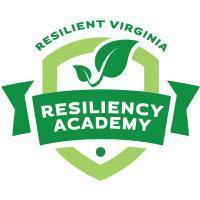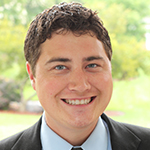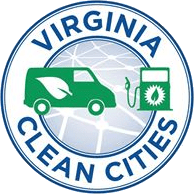Accelerating resiliency planning in communities across the Commonwealth
Spring 2022 Resiliency Academy: Components of a Resilient Community
The Resiliency Academy Spring 2022 series featured four webinars highlighting the four components of a resilient community that are championed by Resilient Virginia.


Abby Johnson, Executive Director, Virginia PACE Authority, and Administrator, Virginia C-PACE Program
Abby will provide information on the new statewide Virginia PACE Authority, and update progress on local C-PACE initiatives, including examples from regional programs.
Abby is Executive Director and founder of VPA. Since 2012, Abby has specialized in PACE financing, advising commercial building owners, lenders and public sector clients in PACE project and program development including crafting of PACE legislation, creating program guidelines, and launching and administering PACE programs. She has been instrumental in developing PACE programs around the country in Pennsylvania, Texas, Illinois, Florida, New Jersey, Louisiana, Oregon, North Carolina, and the Mid-Atlantic region, including Virginia.
In Virginia, Abby was largely responsible for expanding PACE over the last five years to include resiliency, stormwater management, commercial condos, and retroactive projects. In 2019, she founded VPA to offer Virginia localities a low-cost, nonprofit option for program administration. Through Abby’s leadership, VPA has received multiple grants, including one that is funding the creation of a web-based platform that connects lenders with borrowers to fund resiliency and clean energy projects. In her capacity as an advisor, Abby works with building owners to develop “PACE-able” projects, structure PACE within the capital stack, and source senior debt as needed.

Roderick Scott, CFM, Board Chair, Flood Mitigation Industry Association
Rod will introduce the new Federal STORM Act and review pending legislation in the Virginia General Assembly that would set up a Resilient Virginia Revolving Loan Fund to support natural hazard mitigation projects.
Rod has over 30 years of construction contracting experience and is a Certified Floodplain Manager (CFM). Since 2008, Rod has been involved in the planning, financing, and execution of 1,500 structural elevation/flood hazard mitigation projects. Rod pioneered post-flood disaster education outreach about flood mitigation elevation in upstate New York after Hurricane Irene (2008) and re-deployed an improved version after Hurricane Sandy (2012) in New Jersey and New York. This effort won the Association of State Floodplain Managers’s (ASFPM’s) 2014 National Flood Proofing Award. In 2016 Rod was certified as a flood plain administrator. Rod is the primary author of the International Association of Structural Movers’ (IASM’s) “Steps to Elevation” and the 8-hour “Home Raising Academy” funded by the Department of Housing and Urban Development (HUD).
In 2019 Rod helped form the Flood Mitigation Industry Association (501c3) and is serving as chair of the Board.

Grace Tucker, Senior Analyst, Climate Resilient Coasts and Watersheds, Virginia,
Environmental Defense Fund
Grace will discuss financing and funding programs that support flood mitigation and adaptation, including the Virginia Beach Flood Protection Bond and the Community Flood Preparedness Fund (CFPF).
Grace is the Senior Analyst for EDF’s Climate Resilient Coasts and Watersheds Virginia team. In this role, she builds and maintains collaborative partnerships with diverse local, regional and national stakeholders to collectively advocate for comprehensive, research-based and equitable planning and policies that reduce flood risk in Virginia. Grace is committed to bringing together sound science and effective communications to develop and implement locally-supported solutions that address historical inequities and build resilience for people and ecosystems now and in the future.

Peter D’Alema, Director of Program Management, Virginia Resources Authority
Peter will provide remarks on VRA’s role in managing local government financing programs.
Peter D’Alema currently serves as the Director of Program Management for Virginia Resources Authority (VRA), which entails managing the Virginia Pooled Financing Program (VPFP). The VPFP offers public bond market access to Virginia localities for infrastructure financing at competitive interest rates. His previous experience includes serving as Financial Manager for VRA and Senior Commercial Underwriter for Bank of America, N.A. He holds a Bachelor’s degree in Marketing Management from Virginia Polytechnic Institute and State University (Virginia Tech) and a Master’s degree in Finance from Virginia Commonwealth University.

Mari Radford, Community Planning Lead, Mitigation Division, FEMA Region 3
Mari will discuss pre- and post- disaster resources such as their National Risk Index tool, FMA and BRIC funding, and the Advanced Assistance Grant (through BRIC funding) that local communities can use for technical assistance in assessing risks and needs.
Mari Radford is the Community Planning Lead for the Federal Emergency Management Agency’s (FEMA) Region 3 office. Mari and her team provide mitigation planning support to the six states and communities that make up Region 3; DC, DE, WV, MD, PA, and VA as required under the Stafford Act. In addition to planning she provides plan reviews and technical assistance, conducts training, and disaster response. She is a member of the Virginia Silver Jackets team.
Previously, she worked with the National Flood Insurance Program as a Planning Specialist and the US Department of State as a Community Liaison Officer.
Mari holds a M.S. degree in Community and Regional Planning from Temple University, and a B.A. degree in History from Willamette University.

Matt Dalon, Program Manager, Coastal Master Resiliency Plan, DCR
Matt will provide background information on the development of the Plan, a review of infrastructure projects identified as priorities in coastal communities, and options for funding these projects as the plan is implemented.
Matt Dalon is the Program Manager for the Virginia Coastal Resilience Master Plan for the Department of Conservation and Recreation. Matt joined DCR in 2021 after 14 years of waterfront engineering and consulting in the private sector to manage the Virginia Coastal Resilience Master Plan contract that was led by Rear Admiral Ann Phillips (USN, Ret.), former Special Assistant to the Governor for Coastal Adaptation and Protection (SACAP). Matt is a Professional Engineer, Certified Floodplain Manager, and has degrees in Civil Engineering from Lehigh University and Ocean and Coastal Engineering from Oregon State University.
About the Virginia Coastal Resilience Master Plan
This first Virginia Coastal Resilience Master Plan is a call to action for the Commonwealth. From growing cities to migrating coastal wetlands, Virginia’s coast faces a new reality. As sea levels rise and severe weather intensifies, climate change is threatening our cherished coastal regions’ economic, cultural, and environmental resources.
The Master Plan leveraged the combined efforts of more than two thousand stakeholders, subject matter experts, and government personnel. Over the course of the past year, we have learned how essential this work is and how much more there is to do.
Abstract
The Virginia Coastal Resilience Master Plan builds on the 2020 Virginia Coastal Resilience Master Planning Framework, which outlined the goals and principles of the Commonwealth’s statewide coastal resilience strategy. Recognizing the urgent challenge flooding already poses, the Commonwealth developed Phase One of the Master Plan on an accelerated timeline and focused this first assessment on the impacts of tidal and storm surge coastal flooding on coastal Virginia.
The Master Plan is a guiding document for the Commonwealth to increase its resilience to flooding and sea level rise. It contains a list of projects identified by the Commonwealth and local leaders that will strengthen resilience in Virginia’s coastal areas. Additionally, the Master Plan pinpoints areas where there are gaps in resilience planning that may need assistance in the future.

Debbie Messmer, State Hazard Mitigation Officer, Virginia Department of Emergency Management
Debbie will inform participants about the recipients of the BRIC and FMA funding from FEMA, and the upcoming timeframe and focus of the next round of funding for mitigation and adaptation projects.Debbie Messmer has worked for the Virginia Department of Emergency Management for 17 years as a Grants Administrator/Project Coordinator, and now as the State Hazard Mitigation Officer. She has managed over $100 million in mitigation grants across the Commonwealth ranging from acquisition and elevation of private residential properties to large-scale stormwater management projects to small educational opportunities. She is currently serving in the role of Earthquake Program Manager for the Commonwealth.
Prior to her time with VDEM, she worked for the North Carolina Division of Emergency Management managing over $80 million in mitigation grants through Hurricane Fran and Hurricane Floyd.
Debbie has four children and two dogs who keep her busy, along with playing tennis and serving on the Board for the Henrico Humane Society.

Shana Udvardy, Climate Resilience Analyst, the Union of Concerned Scientists’ Climate & Energy Program
Shana will review the resiliency-related aspects of the new Infrastructure Investment and Jobs Act (aka Bipartisan Infrastructure Act) and other federal legislation, such as the National Adaptation and Resilience Strategy Act, which was recently introduced.
Shana Udvardy is a climate resilience analyst with the Climate & Energy program at the Union of Concerned Scientists. She conducts research and policy analysis to help inform and build support to increase resilience to climate change impacts. Prior to joining UCS, Ms. Udvardy provided consulting services on climate adaptation and flood risk management policy. She was also the climate adaptation policy analyst at the Center for Clean Air Policy, director of flood management policy for American Rivers, and water program manager at the Georgia Conservancy. Ms. Udvardy also worked at the Smithsonian Institution’s Monitoring and Assessment of Biodiversity Program and was a Peace Corps volunteer in Nicaragua.
Ms. Udvardy is a Certified Floodplain Manager, and holds a M.S. in Conservation Ecology and Sustainable Development from the University of Georgia’s Odum School of Ecology and a B.A. from Syracuse University’s Maxwell School.
Ms. Udvardy is frequently called upon to speak on climate adaptation and flood risk management, including two State Department speaking tours in Bangkok and Manila in 2014 and Cambodia, Vietnam, and Laos in 2012.

Denise Nelson, P.E., CFM, Env SP, LEED AP
Director of Resilience and Grants, Launch! Consulting Inc.
Denise will report on the current status of climate, flood, and sea level rise regulations in the state and how the 2022 Virginia General Assembly results impact resiliency policy and programs. She will also review the relevant sections of the 2022 Infrastructure Investment and Jobs Act and provide information on programs and funding.
Denise Nelson has 20 years of experience in design and application of best practices for water resources, sustainable development, and resilience across the globe. She is an Environmental Engineer, Certified Floodplain Manager, Envision Sustainability Professional, and a LEED AP. She received a Bachelor of Science degree in Civil Engineering from Virginia Tech and a Master of Science degree in Environmental Engineering from the University of Cincinnati.
Denise is currently the Vice President for Resilience and Grants at Launch! Consulting. She is also the Vice President of the Mid-Atlantic chapter of the American Public Works Association and is active in sustainability committees for the American Society of Civil Engineers and the Virginia Water Environment Association.

Jenn Clarke, Program and Operations Supervisor
City of Richmond Stormwater Utility
Jenn will update us on the progress of Richmond’s Green Infrastructure Master Plan and associated Ranking Tool. Created in partnership with the Alliance for the Chesapeake Bay, these are instruments which will help the City as a whole to address flooding and pollution issues.
Jenn is an optimistic gardener, an enthusiastic (if not slightly overzealous) board and card game player, an amateur but avid knitter, and a Program and Operations Supervisor with the City of Richmond’s Stormwater Utility and their integrated RVAH2O Clean Water Initiative. With diverse experience at the intersection of human and environmental wellness, Jenn is passionate about building relationships, partnerships, community, and infrastructure in an effort to effect positive hands-on change to improve the health of the James River and how life is enjoyed along it.
Jenn originally hails from Washington State, where she received her BA in Environmental Studies at the University of Washington.

Michael (Mike) Sanio, F.ASCE, CAE, ENV-SP
American Society of Civil Engineers
Mike will provide an overview of the American Society of Civil Engineers’ retrofit of their corporate parking lot to be a showcase of innovative options in stormwater management and pollution reduction for the highly urbanized Northern Virginia region. Mike will also discuss new initiatives from ASCE to support resiliency through industry standards.
Mike held the position of Executive Advisor on Sustainability at the American Society of Civil Engineers (ASCE) where he was responsible for providing exceptional leadership on sustainability globally.
One of his most notable accomplishments was his work on establishing a sustainability program that led to the formation of the Institute for Sustainable Infrastructure and the development of the Envision Rating System. Mike was also instrumental in the creation of a sustainable infrastructure standard, the development of ASCE’s new Sustainable Infrastructure Certificate Program, the creation of a series of successful International Conferences on Sustainable Infrastructure (ICSI), and most recently in the formation of the International Coalition for Sustainable Infrastructure.
Mike has a Bachelor of Science degree in Mechanical Engineering from Carleton University in Ottawa, Canada; a Master Science degree in Mechanical Engineering from the University of Texas in Austin; and received Profesor Honorario al doctor from Universidad Ricardo Palma, Lima 2009.

Brad Kreps, Clinch Valley Program Director, The Nature Conservancy
Brad will inform participants about the Cumberland Forest Project, which includes acquisition of more than a quarter-million acres of forest with the goal of restoring natural diversity, minimizing climate impact, and enhancing environmental and economic resilience.Brad Kreps joined The Nature Conservancy in 2001 and leads the Clinch Valley Program in Southwest Virginia and northeastern Tennessee—a community-based conservation program that has helped conserve more 200,000 acres of critical natural habitat in one of North America’s hotspots for biodiversity. Key projects include the 250,000-acre Cumberland Forest, the 23,000-acre Clinch Valley Conservation Forestry Program, the Clinch River State Park, rare freshwater mussel augmentation programs, and management partnerships with local farmers and communities.
In the Clinch Valley, the Virginia chapter is pioneering approaches to conservation that demonstrate its connection to the needs of people and how to achieve outcomes at a scale that can support TNC’s continental vision and priorities.

Alleyn Harned, Executive Director, Virginia Clean Cities
Alleyn will provide an overview of the new opportunities for programs promoting cleaner transportation in Virginia, with a review of existing state initiatives, updates about Virginia Clean Cities, and results from the 2022 General Assembly.Alleyn Harned is the Executive Director of Virginia Clean Cities (VCC), a member of the U.S. Department of Energy-affiliated Clean Cities Coalition program.
Alleyn joined Clean Cities in 2009, the same year Virginia Clean Cities, Inc., formed a partnership with James Madison University. That partnership allows Clean Cities and the university in Harrisonburg, Va., to work together to leverage resources, support alternative fuel initiatives, and pursue opportunities to decrease pollution and reduce dependence on foreign oil.
Prior to being named Executive Director, Alleyn served as the VCC‘s Business Development Director. He served as the Virginia representative to the nine-state Southeast Natural Gas Vehicle Corridor Committee, and was coordinator for Virginia’s initial 2010 electric vehicle readiness effort. Harned was an appointee to Virginia’s Energy Commission in 2014 and the State Advisory Board on Air Pollution in 2013. Harned serves as the President of the Transportation Energy Partners Board of Directors and has served twice as the Mid-Atlantic representative to the Clean Cities Coordinator Council. Harned led the coalition through the completion of the 1,200-vehicle Southeast Propane Autogas Development Project under the American Recovery and Reinvestment Act.
Alleyn has worked on transportation- and energy-related issues in Virginia since 2006. Before joining the VCC staff, Alleyn served as the Assistant Secretary of Commerce and Trade for the Commonwealth of Virginia, where he assisted in drafting Virginia’s initial Energy Plan, and participated in the Virginia Commission on Climate Change and Governor’s Energy Policy Advisory Council. Harned is a graduate of Ohio Wesleyan University, and has his Masters degree in Public Administration from James Madison University with a focus on community economic development.
With Virginia Clean Cities, Harned leads the Virginia Clean Cities coalition’s collaborative effort to assist stakeholders and the Commonwealth in programs to improve air quality and increase American energy security and economic opportunity through the increased use of alternative fuels and vehicles. Operating since 1996, Virginia Clean Cities has successfully managed tens of millions of dollars of federal, state, and stakeholder vehicle and infrastructure programs from offices on the James Madison campus in Harrisonburg, Va. Examples of past projects are the nation’s largest propane autogas vehicle deployment project, which covered 13 states; the Richmond Electric Vehicle initiative, which facilitated vehicles; and a Virginia, DC, and Maryland ethanol deployment project which installed the first ethanol stations in the mid-Atlantic region. Alleyn’s theory of change involves incremental collaborative team leadership, and he drafted the nation’s only successful dual-state station deployment project for the 2015 USDA Biofuels Implementation Partnership.

Angela Conroy, Senior Air Quality Planner, Virginia Department of Environmental Quality (DEQ)
Angela will update the audience on how the $93 million in funds from the Volkswagen Settlement Agreement has been allocated through the Environmental Mitigation Trust Fund for EV charging network projects, electric buses for schools, the port electrification project, and the Clean Air Communities Program, and what funding is still available for grants to localities.Angela supports DEQ’s climate mitigation planning efforts and leads the implementation of the Volkswagen Environmental Mitigation Trust on behalf of the Commonwealth. She has more than 20 years of experience in environmental program and project management for federal government agencies including the U.S. EPA, the Department of Energy, and the Department of Interior.
Ms. Conroy has an extensive background in renewable energy and the redevelopment of disturbed lands and landfills. She has co-authored technical guidance such as Best Practices for Siting Photovoltaics on Municipal Solid Waste Landfills, Handbook on Siting Renewable Energy Projects While Addressing Environmental Issues, and published articles on environmental and energy topics for the Global Association of Risk Professionals (GARP).
Ms. Conroy has a B.S. in Environmental Science from Ferrum College, an M.B.A. and M.S. in Environmental Management from the University of Maryland, and graduate studies in Urban and Regional Planning at Virginia Tech.

Caetano de Campos Lopes, Director of Climate Policy, The Community Climate Collaborative
Caetano will provide information about the C3 Virginia Transit Tool, that supports community-led initiatives to advocate for better transit planning and will illustrate this approach as it is being carried out in the Charlottesville area.Caetano works collaboratively with local and regional decision-makers to design customized climate policies that are based on a combination of well-recognized best practices, community input, and region-specific information. In Argentina, he worked in investment banking, market studies, antitrust advocacy, and sustainable energy management policies. Caetano’s work included developing analyses and presentations that led the City of Buenos Aires to fund a project that significantly improved energy efficiency for 40,000+ high-poverty households.
In the United States, Caetano has worked for the Citizens’ Climate Lobby (CCL), the American Council for an Energy-Efficient Economy (ACEEE), and more recently for The Economist Group. He has presented policy proposals to U.S. Congress representatives and foreign embassies, led workshops in universities, and wrote reports on local, national, and international climate policies.
Caetano holds a master’s degree and a bachelor’s degree in economics and has a master’s degree in environmental management.

Susan Howard, Director of Policy and Government Relations American Association of State Highway and Transportation Officials
Relevant programs and funding created through this Federal legislation will be presented.Susan Howard serves as Director of Policy and Government Relations at the American Association of State Highway and Transportation Officials (AASHTO), a nonprofit, nonpartisan association representing transportation departments in the 50 states, the District of Columbia, and Puerto Rico. She works to advance AASHTO’s federal legislative and policy efforts and serves as a key liaison between AASHTO and Congress, the U.S. Department of Transportation, and other national organizations. Susan previously held the position of Program Director for Transportation Finance and Program Manager for Freight at AASHTO.
Prior to joining AASHTO in 2018, she worked as Director of Government Relations for the National Association of Development Organizations. She also served as the Federal Programs Coordinator for the North Carolina Department of Transportation and worked on Capitol Hill as a Legislative Assistant, responsible for transportation issues for a senior member of the House Appropriations Committee.
Susan earned a Bachelor’s Degree in Political Science from Guilford College in Greensboro, NC.




